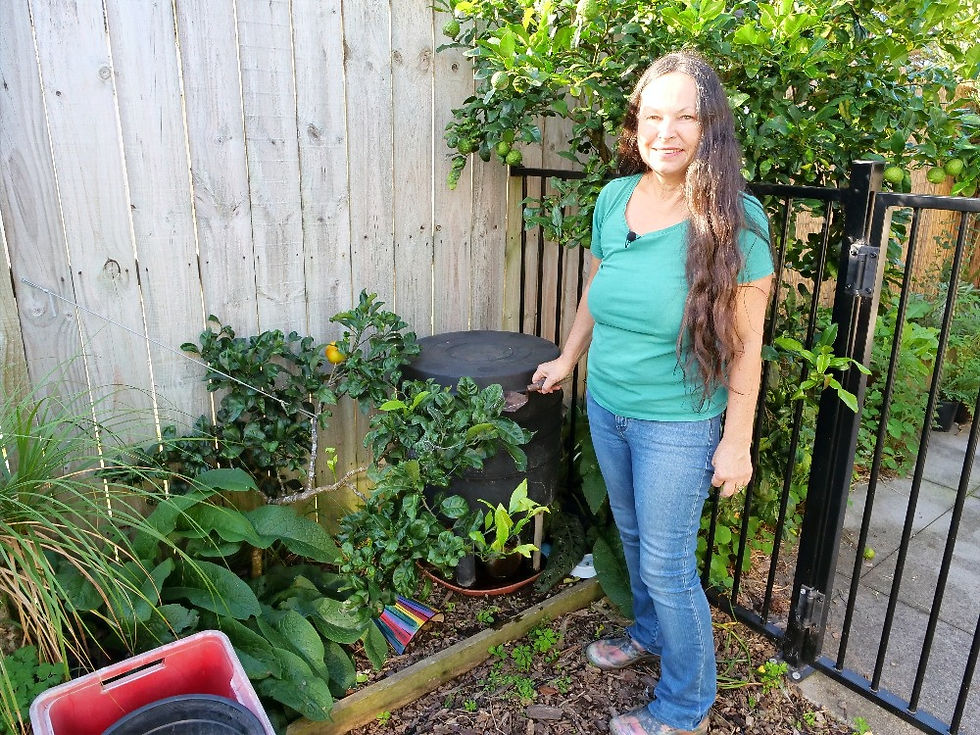Herbs for Winter Wellness
- Toni Kenyon

- May 18, 2021
- 3 min read

It's the time of the year when I turn my mind to what I need to be 'brewing' to keep me well over the coming cooler months.
There are so many herbs and vegetables growing in the garden that can be utilised to make simple 'remedies' and 'potions' to support the immune system.
We usually have a jar of 'something' sitting around the kitchen percolating at any one time.
I like herbal vinegars and infusions, because you can adapt them by adding whatever it is that your body needs at the time.
Before we continue, the obligatory disclaimer/reminder:
I'm a 'lay-herbalist' which means that I have no formal qualifications--just a love of herbs.
I have been studying these fascinating plants for more than three decades.
Herbs are food (and the recipes that I'm giving you include herbs and vegetables that you eat on a daily basis) but preparing them this way does make them stronger. Please do your own research if you are concerned in any way that what you may be taking could affect your health or any other medication that you may be taking.
Having gotten that out of the way, I feel certain that if most people read the fine print on the back of a pain-killer purchased from the supermarket they would never take the stuff again. Most people pop these mass-produced, hospital grade drugs like lollies with no fear of the contra-indications (a big word for what might happen in your body or with other medication).
*stepping off my soap box*
Onwards!
Vinegars are simple preparations that have been used for centuries. In this instance, vinegar is the substance that we are going to use to extract the constituents from the herbs and preserve them.
There are many substances you can use to extract the active constituents from herbs, water, alcohol, glycerine, vinegar (to name a few).
I stay away from alcohol because I am an alcoholic and I have been in recovery for nearly 20 years as I write this. I don't want to poke that bear again!
Step 1:
Gather the herbs & other ingredients (preferably herbs from your own herb garden).

Step 2:
Chop up into fine pieces. You want your materials finely chopped, because that gives the vinegar a better chance to extract all the goodness and constituents.

Step 3:
Layer the chopped materials into a wide-mouthed glass jar.

Step 4:
Grate any roots that may need grating and crush any hard spices that you are adding to your vinegar.
These can then be added to the jar.
Step 5:
When you've filled your jar, or you have enough material in your jar (it doesn't actually need to be full) cover the material with vinegar.
I love how pretty the jars look at this stage. Aren't the colour combinations beautiful?
Step 6:
Seal the jar and leave it somewhere warm for 3-4 weeks for the vinegar to infuse. I like to put some paper between the lid and the jar to save the metal from being corroded by the vinegar.

Some people leave their vinegars to sit, but I like to give mine a shake every day, just to help the process along. I also like the feeling of intention that connecting with herbs and vinegars on a daily basis gives me.
Homemade herbal remedies are wonderful things to create.
It's empowering to be able to take herbs and vegetables from your garden (or that you have bought locally) and turn them into remedies to keep your immune system healthy.
I'm a huge fan of hands-on-healing and I love the support that my garden gives mine and my family's overall health.
We all know how important it is to keep our immune systems in tip-top shape, especially as we head into the winter months.
I've been a firm believer for years that food should be our medicine.
Simple herbs and vegetables that you grow at home can become powerful immune system boosters if you know how to prepare them correctly.
I've put together my two favourite herbal recipes for keeping winter cold and chills at bay.
Click on the picture below or this link and I'll send them to you.
Love & Lettuce,
Toni xx
















Comments